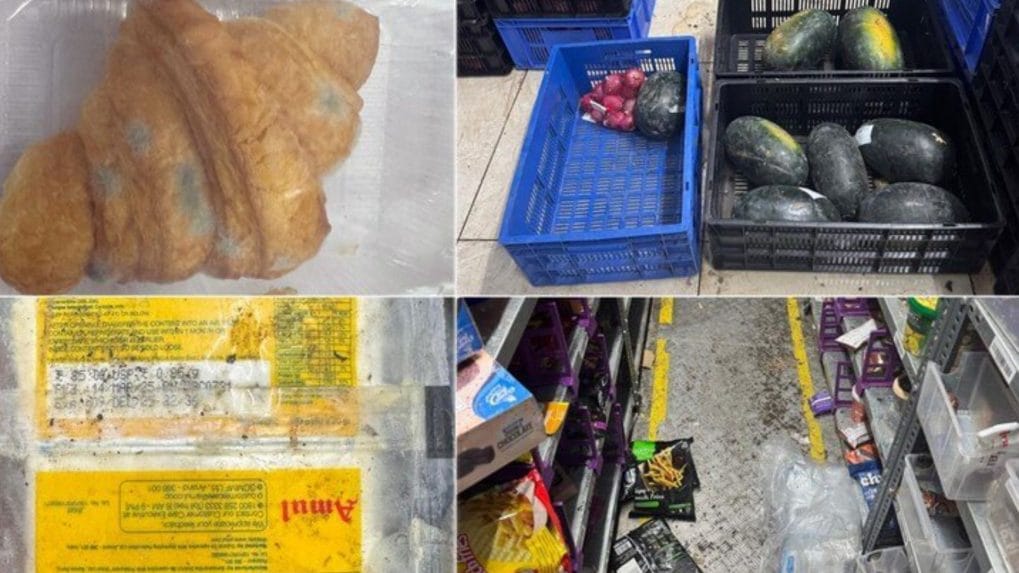Advertising
From Pink Slips to Silent Sidelining: Inside adland’s layoff and anxiety crisis

The quick commerce boom is facing a backlash, with big FMCG brands in the country becoming increasingly cautious about partnering with the leading players due to their repeated instances of consumer norm violations and hygiene breaches. Regulatory raids have uncovered alarming practices at quick commerce dark stores operated by players like Zepto and Blinkit, including the sale of adulterated and expired products.
Besides, customers have also taken to social media to share their grievances, highlighting instances of fake or spoiled products, such as Amul butter, expired ice creams, and rotten milk, among others. As the quick commerce industry scales up its dark stores rapidly, the consumer protection body has shared concerns regarding the impact on food safety and hygiene.
The recent lapses at a Zepto facility in Mumbai and a Blinkit store in Pune have made big FMCG brands re-evaluate their contractual agreement with the industry players.
Surprise visits
Calling regulatory scrutiny a double-edged sword, Siva Balakrishnan, CEO & Founder of Vserve, said adherence to regulations can reinforce brand value for a D2C FMCG firm, but any negligence, direct or indirect, can harm consumer perception.
According to Sweta Rajan, Partner, Economic Laws Practice, several brands are actively working with their distributors to tighten contractual safeguards across the supply chain. This includes pushing for the inclusion of stricter clauses related to brand safety, expiry date compliance, and inventory rotation, as well as ensuring that responsibilities for regulatory compliance are clearly assigned.
"Brands are seeking assurance that their products are not mishandled or sold past shelf life, even when they are not directly in control of the platform relationship," Rajan added.
Madhav Kasturia, Founder & CEO of quick commerce logistics startup Zippee, said that earlier brands asked the players to promote them, but things have changed after the raids.
"The big companies are doing a surprise recce of dark stores where the SKUs are being stored". He said one of the brands warned them that they would terminate the contract if they found even one near-expiry push on the platform. "Brands have every reason to get strict because when FSSAI flags happen, it’s the brand on the firing line, not us," Kasturia added.
Storyboard18 reached out to Hindustan Unilever, Dabur Ltd, ITC Ltd, Amul, and Marico, but they declined to comment.
Kasturia added, "It doesn’t matter if you delivered in 8 minutes, if it’s stale or expired, that’s the only thing the customer remembers".
Since margins in FMCG products are thin, he said the unhealthy practices at dark stores will cause brands to lose not just customers but also reorders, referrals, and basket value.
However, Business & Brand-strategy specialist Harish Bijoor said more than consumer goods brands, quick commerce companies should be paranoid about date codes, quality, efficient storage facilities, as the new-age customers are aware of the real defaulter.
According to Balakrishnan, the increased scrutiny will elevate industry standards, rewarding those who prioritise quality, safety, and customer trust.
'Training gig workforce'
While re-evaluating agreements may provide temporary relief to brands, unless the underlying issues are addressed, similar violations are likely to recur.
Pratik Vaidya, Managing Director at Karma Management Global Consulting Solutions Pvt Ltd, suggested that quick commerce players should comply with labour law regulations so that the staff at the warehouses do not lose morale and provide better services.
Vaidya highlighted the exploitative nature of dark stores, saying that more than 50 percent lack basic amenities like proper seating, water, or toilets. "Workers normally spend 10-12 hours on their feet with inadequate breaks, some franchise-run dark stores impose extreme speed targets, expecting packers to fulfil most orders within 2 minutes, backed by penalties. This pressure-cooker environment can directly impact product safety as the overworked staff fail to spot expired stock," he added.
A dark store manager of Swiggy Instamart told Storyboard18 that he follows five steps to check expired, near-expiry, and rotten products. This includes: Use the FIFO (First-In, First-Out) method; audits and quality checks twice a day; use of Power BI to monitor inventory to track the real-time health of the inventory, and training for ASMs (assistant managers) to improve customer experience.
For any lapses, such as picking the wrong item, packing expired or damaged product, or violation of hygiene protocols, he explained the process: "We first start with a written warning to the store worker, followed by additional training. If the mistake is serious, termination is the only viable option left".
'Kirana significance'
As dark stores face increasing criticism for lacking transparency and failing to meet hygiene standards, traditional kirana stores may emerge as the more trustworthy alternative. Somdutta Singh, Serial Entrepreneur, Founder and CEO of Assiduus Global, said that well-run kiranas that maintain visible standards may earn renewed trust of consumers, but he maintained that dark stores will not replace kiranas, instead they will coexist.
Striking the similar chord, Balakrishnan said consumer preference may shift to trusted local stores, especially for fresh and daily-use items if quick commerce platforms do not rectify current lapses.
On the other hand, Bijoor asserted that kirana stores will continue to remain under deep pressure as their volumes and margins are vanishing because of the aggressive penetration of quick commerce players in tier-2 and 3 cities.
"The real opportunity lies in digitizing kirana networks to match the reliability consumers now expect from structured models," Singh said.
From purpose-driven work and narrative-rich brand films to AI-enabled ideas and creator-led collaborations, the awards reflect the full spectrum of modern creativity.
Read MoreLooking ahead to the close of 2025 and into 2026, Sorrell sees technology platforms as the clear winners. He described them as “nation states in their own right”, with market capitalisations that exceed the GDPs of many countries.